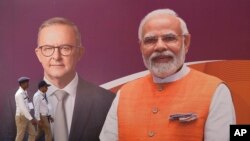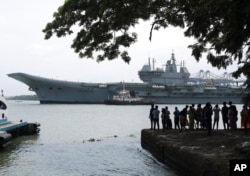Australian Prime Minister Anthony Albanese is in India for a visit expected to consolidate ties as both geopolitics and commercial interests drive a closer partnership between the two countries.
Analysts say the relationship between New Delhi and Canberra, marked by indifference just a few years ago, has become the fastest growing in the Indo-Pacific region amid mutual concerns about China's assertiveness.
"Since the COVID-19 pandemic, Australia has moved decisively away from China whereas earlier they were hesitant to challenge them on many issues," according to Sreeram Chaulia, dean of the Jindal School of International Affairs. "Now both India and Australia have a clear strategic outlook, that is to counterbalance China. This convergence is one factor bringing the two countries closer."
On Thursday, a day before holding formal talks, the Australian and Indian prime ministers engaged in some cricket diplomacy as they watched the start of a cricket match between the two countries in the western city of Ahmedabad. Thousands of fans cheered as they went around the stadium before its start.
"An incredible welcome to Ahmedabad, India. The beginning of an important trip for Australia-India relations," the Australian prime minister tweeted after his arrival.
Albanese is also scheduled to travel to Mumbai where he will become the first foreign leader to be taken on board India's indigenously produced aircraft carrier INS Vikrant that was commissioned last September and will boost its naval capabilities.
The strategic partnership has been growing since 2020, when India overcame its hesitation of a closer strategic alliance with Australia and invited it to join the annual naval Malabar exercises that New Delhi conducts with the United States and Japan. Last December, the Indian and Australian armies also held their first joint drills in India.
Both countries are members of the Quad grouping that, along with the United States and Japan, seeks to counter China's efforts to dominate the Indo-Pacific region.
Analysts say India's increasingly warm relations with the United States have been integral in reshaping ties between New Delhi and Canberra.
"Now both India and Australia are aligned with the United States in the Indo-Pacific region. That is really the cement that is binding the ties," according to Manoj Joshi, Distinguished Fellow at New Delhi's Observer Research Foundation. "The U.S. is the linchpin driving the Indo-Pacific strategy."
The Australian prime minister's talks with India's Prime Minister Narendra Modi in New Delhi on Friday will be the first of the annual summits that the two countries decided to hold last year.
Albanese has come to India accompanied by several ministers and a large business delegation as boosting commercial ties is also high on the agenda.
Last year, the two countries signed a free trade agreement — the first signed by India with a developed country in a decade. Both are also negotiating a more ambitious trade pact, but that has not made much headway so far.
Australia is seeking to diversify markets for its goods following a trade dispute with China that erupted in 2020 when Beijing imposed sanctions on a range of Australian exports after Canberra called for an investigation into the origins on the COVID-19 pandemic.
For its part, India, which wants to expand its manufacturing sector, is looking at Australia as a major supplier of critical minerals essential to produce mobile phones, electric cars and solar panels.
Before departing for India, Albanese told reporters that India, which along with Indonesia would grow to be the world's third and fourth largest economies, presented "an incredible opportunity" for Australia.
Speaking in Sydney at a business forum earlier this week, Albanese said that "Australia wanted greater diversity in who we trade with and greater variety in what we trade, meaning our economy is more resilient and more secure."
Said Chaulia: "Both sides expect the trade volumes to double to $50 billion over the next five years. That is higher than what we are doing with Japan or any other regional country."
However, China, Australia's largest trading partner, remains economically critical for Canberra.
"India will not be able to replace China as a major market for Australia unless the Indian economy grows substantially in the coming years," Joshi said.






